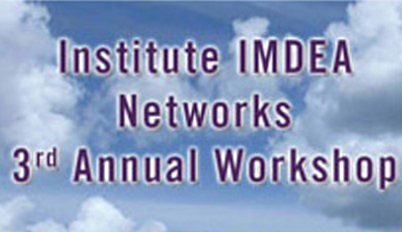IMDEA Networks

Conference Takes A New Approach To Studying The Internet And Social Networking
23 May 2011

Institute IMDEA Networks’ Third Annual Workshop brought together experts from around the world on the theme of Internet Science, with emphasis on social networking.
Institute IMDEA Networks has announced the successful completion of its Third Annual Workshop, devoted to the theme of Internet Science, with a particular focus on social networking. The one-day, invitation-only event was held on May 18th, at the Leganes Campus of University Carlos III of Madrid, and brought together experts from around the world to discuss the formulation of an Internet Science — an approach to studying and developing the Internet that combines elements of computer science, engineering and the humanities.
The current boom occurring in the evolution of social networking is an example of the way in which the Internet has become a central element in our social fabric. This evolution of the Internet — and its profound and growing influence on almost every facet of our daily lives — demands a greater understanding of reciprocal influences linking the Internet and broader socioeconomic systems, and of the prospects and limitations associated with our attempts to extend the current Internet and influence its future development. Internet Science aims to bring together experts from areas as diverse as network engineering, sociology, economics, biology, physics or political science in a joint effort to discover successful solutions to the Internet’s increasing complexities. The Internet’s evolution appears very much linked to that of our social model and it is in fact revolutionizing our ways of being in the world. In this context, the role to be played by Internet Science in the evolution of human knowledge lies in its capacity and willingness to embrace complexity and multidirectionaly enrich other disciplines.
 Talks at the Institute’s Workshop ranged from technical topics such as a techno-social analysis of Twitter by Miranda Mowbray of HP Labs, UK; to an exploration of the “grand challenge” societal problem of the road transportation network by MIT’s Hari Balakrishnan; to a presentation by ETH Zurich’s Dirk Helbing of the 10-year, 1 billion Euro FuturICT flagship project, aimed at understanding and managing complex, global, socially interactive systems, with a focus on sustainability and resilience.
Talks at the Institute’s Workshop ranged from technical topics such as a techno-social analysis of Twitter by Miranda Mowbray of HP Labs, UK; to an exploration of the “grand challenge” societal problem of the road transportation network by MIT’s Hari Balakrishnan; to a presentation by ETH Zurich’s Dirk Helbing of the 10-year, 1 billion Euro FuturICT flagship project, aimed at understanding and managing complex, global, socially interactive systems, with a focus on sustainability and resilience.
Other presentations included an analysis by Jon Crowcroft of the University of Cambridge, UK, and one Internet’s renowned pioneers, of the way in which Twitter is operating as a force for increasing the diversity of political views; and a discussion by Nick Maxemchuk of Columbia University of which technologies could be the most likely to replace the next-generation Internet. Cecilia Mascolo of the University of Cambridge presented a study of Geo-Social Networks, Social Cascades and Applications, and Miranda Mowbray of HP Labs, UK, presented an analysis of Twitter as a techno-social network.



Recent Comments